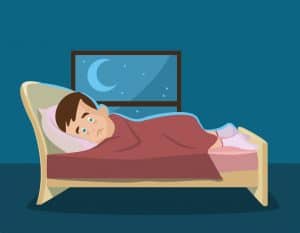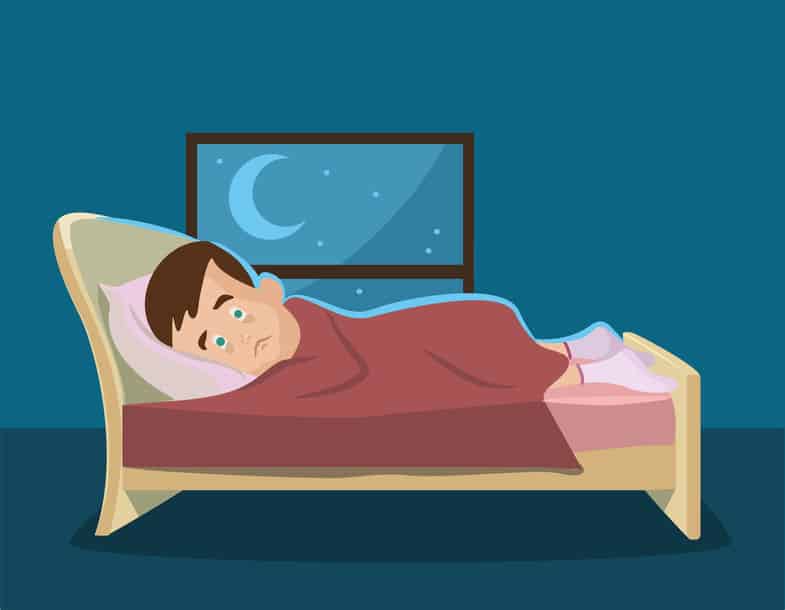Share This Article
Don’t Sleep on Somniphobia – the Fear of Falling Asleep
There aren’t many things that are true for all people on Earth, but this is one of them: we all need to sleep.
Some things are so simple that we might not even notice them. In what other part of life today is everything the same? People think of death as “The Great Equalizer,” but we’re all the same before we need to sleep—and we can still live to tell the tale.
That doesn’t change the fact that the story is scary for some. In fact, for some people, the thought of going asleep can be downright scary. Some people are afraid of dying before they go to sleep, and others can’t sleep because they’re afraid someone will wake them up in the middle of the night.
What is the fear of going asleep, what is its name, what causes it, what sets it off, and what are its symptoms? If you have it, what can you do to get a good night’s sleep again? You need to know what you have to deal with first, so let’s get started.
What is the Fear of Falling Asleep called?
In this case, it’s somniphobia. It derives its name from “Somnus,” an Ancient Greek ideal of Sleep as a personified concept.
One thing to note at the start is that, while somniphobia and a generalized fear of sleeping are not the same as insomnia, the former can contribute to the latter. If you are afraid of falling asleep, you may consciously or subconsciously struggle against doing so, which in turn could leave you with insomnia and all the health problems it can cause. If you struggle with nightmares, that can obviously impact your fear of sleep as well.
Tackling somniphobia thus means taking on a whole host of other conditions.

The Different Forms of Sleeplessness Due to Somniphobia
One of the most difficult aspects of diagnosing a fear of falling asleep phobia is that those fears take on many different shapes. There is the fear of falling asleep and not waking up, and this is connected to but still distinct from the fear of dying when falling asleep—and that’s not even addressing the fears surrounding different types of nightmares.
Simply put, there are any number of reasons why you might be losing sleep over sleeping. On the one hand, that may not be the kind of thing you want to read before going to bed. On the other hand, hopefully it will help contextualize your particular phobia, help you understand it and, in the process, allow you to sleep easier at night.
Causes and Triggers for the Fear of Sleeping
There are many potential causes of somniphobia, with some of the most common being as follows:
- Nightmares: Everyone has nightmares, but some of us have more of them than others or experience them more intensely. This can contribute to somniphobia.
- Anxiety: The more anxiety you have, the greater trouble you may have falling asleep. Unsurprisingly, this is especially true if the source of your anxiety is the idea of sleep itself. What’s more, not only can anxiety keep you from falling asleep, even when you are able to do so, it can increase the likelihood of you experiencing nightmares. This creates a vicious circle of sleeplessness, nightmares, terror, and fatigue.
- Sleepwalking: While the causes of sleepwalking are themselves still subject to study, anxiety over doing so can morph into a fear of sleeping as a whole.
- Fear of death: In perhaps the most famous speech in English literature, Hamlet famously connects “that sleep of death” with “what dreams may come.” Hamlet’s metaphor underlines and conflates the fear of death and the unknown, which Hamlet describes as “the Undiscovered Country” and which can likewise contribute to a fear of falling asleep and not waking up.
- Horrific imagery: Works such as Hamlet tap into that fear and connection of sleep and death, but films such as the Nightmare on Elm Street franchise take it to another level. While they may be considered cheap slasher movies, the fact they draw a far more literal (and extremely graphic) connection between sleep and death can cause or heighten a fear of dying when falling asleep as happens in the films.
- Personal trauma: If you have suffered a traumatic incident linked with sleep, it can cause an overarching phobia. For example, if you come to link sleep with death because of a loved one who died in their sleep, that deeply traumatic moment can metastasize into a full-blown phobia.

Symptoms of Somniphobia
These physical and physiological symptoms are the body’s natural response to perceived threats and can vary in intensity from person to person. Individuals with somniphobia may experience these symptoms when confronted with the prospect of sleep or when trying to fall asleep.
Physical Symptoms of Somniphobia:
- Rapid Heartbeat: Anxiety and fear about sleep can lead to an increased heart rate, also known as palpitations.
- Shortness of Breath: Individuals with somniphobia may experience shallow or rapid breathing when confronted with the prospect of sleep.
- Sweating: Profuse sweating, particularly cold sweats, is a common physical response to heightened anxiety or fear related to sleep.
- Trembling or Shaking: Anxiety can lead to trembling or shaking, often in the hands or legs.
- Nausea or Upset Stomach: The fear of sleep can manifest physically as stomach discomfort, queasiness, or even nausea.
- Muscle Tension: Tense muscles, frequently accompanied by stiffness or pain, are physical manifestations of anxiety and fear.
- Dizziness or Lightheadedness: Some individuals may feel dizzy or lightheaded due to anxiety about sleep.
- Clammy Hands: Anxiety often leads to sweaty and clammy hands.
- Dry Mouth: Anxiety can cause a dry mouth and difficulty swallowing.
- Increased Blood Pressure: Anxiety may temporarily increase blood pressure, leading to sensations of lightheadedness or discomfort.
Psychological Symptoms of Somniphobia:
- Anxiety and Worry: Persistent and excessive anxiety about the prospect of falling asleep, often accompanied by racing thoughts.
- Panic Attacks: Sudden and intense episodes of fear and distress when thinking about or attempting to sleep, characterized by symptoms like a racing heart and shortness of breath.
- Avoidance Behavior: Frequent efforts to avoid bedtime, such as staying up late or seeking distractions to delay sleep.
- Catastrophic Thinking: Pervasive fear of what might happen during sleep, including concerns about loss of control, nightmares, or traumatic experiences.
- Nighttime Phobias: Development of specific phobias related to nighttime and sleep, which can lead to significant distress.
- Depersonalization: Feelings of detachment from oneself or reality when confronted with sleep or sleep-related fears.
- Hyperarousal: An exaggerated state of alertness and heightened startle response, especially when trying to fall asleep.
- Rumination: Frequent and intrusive thoughts about sleep and sleep-related fears that interfere with daily functioning.
- Sleep Disturbances: Consistent disruptions in sleep patterns due to anxiety, including difficulty falling asleep, frequent awakenings, or early morning awakenings.
- Fatigue and Irritability: Chronic sleep disturbances and anxiety about sleep can lead to daytime fatigue, mood changes, and irritability.
Diagnosing the Fear of Sleeping
One of the trickiest aspects of this condition is diagnosing it and distinguishing it from other conditions which may get in the way of sleep. After all, we all have difficulty sleeping sometimes. How can you distinguish somniphobia from insomnia, or even from simply being unable to obtain restful sleep?
Some of the most characteristic factors in diagnosing a fear of sleep in particular include:
- A dip in the quality of your sleep, especially if this is persistent and directly related to feelings of fear or anxiety.
- Your mental or physical health being directly and negatively affected.
- The lack of sleep being severe enough to cause problems in your personal or professional life.
- Suffering from the condition for a sustained period of time (at least six months).
- Having an aversion to sleep in particular, separate from other potential issues.
Treatment for Somniphobia
These self-help and professional strategies can be effective in managing somniphobia. If the self-help options do not make headway it is important to consult a mental health professional if your fear significantly impacts your daily life or you require additional guidance and support.
Self-Help Treatment Options for Somniphobia:
- Sleep Hygiene: Establish a consistent sleep routine. Maintain regular sleep and wake times, and create a relaxing bedtime ritual to signal your body that it’s time to sleep.
- Relaxation Techniques: Practice relaxation exercises before bedtime, such as deep breathing, progressive muscle relaxation, or meditation, to reduce anxiety and promote calmness.
- Mindfulness Meditation: Engage in mindfulness meditation to stay focused on the present moment and alleviate racing thoughts that contribute to anxiety about sleep.
- Cognitive Restructuring: Identify and challenge negative thought patterns related to sleep and bedtime fears. Replace them with more balanced and positive beliefs.
- Exposure Therapy: Gradually expose yourself to situations related to your fear of sleep in a controlled and safe manner. For example, you can work on relaxing in your bedroom without attempting to sleep.
- Bedroom Environment: Create a sleep-friendly bedroom by ensuring it is comfortable and free from distractions. Adjust lighting, room temperature, and bedding to your preference.
- Limit Stimulants: Reduce or eliminate caffeine and nicotine intake, especially in the hours leading up to bedtime, as they can interfere with sleep.
- Limit Screen Time: Minimize screen time before bedtime, as exposure to the blue light emitted by devices can disrupt your sleep-wake cycle.
- Keep a Sleep Diary: Maintain a sleep diary to track your sleep patterns and identify any triggers or patterns related to your somniphobia.
- Seek Social Support: Talk to friends, family, or a support group about your fear of sleep. Sharing your experiences and fears can provide emotional relief and helpful insights.
Professional Treatment Options for Somniphobia
- Create a Sleep-Friendly Environment: Make your bedroom conducive to sleep by customizing it according to your comfort. This might involve ensuring it’s dark, or for those with a fear of darkness, having a nightlight to provide a sense of security.
- Exposure Therapy: Some individuals benefit from controlled exposure to the causes of their somniphobia. This can involve discussing the underlying causes of the fear or gradually confronting images related to their anxiety under the guidance of trained mental health professionals.
- Relaxation and Visualization Techniques: Practice relaxation and visualization exercises to calm anxiety, such as visualizing peaceful images or scenarios to counter the fear of sleep.
- Cognitive Behavioral Therapy (CBT): Undergo CBT to rewire your thought patterns away from negative associations with sleep-related fears. This therapeutic approach can help you change your mindset regarding aspects of sleep that cause anxiety.
- Medication-Based Options: In some cases, medication may be considered. Beta blockers can address general anxiety, while benzodiazepines may be prescribed for sedation. However, it’s crucial to use these medications under the guidance of a physician, and they are typically intended for short-term use only due to the risk of addiction.
Living with Somniphobia
The fear of falling asleep, can be very upsetting. A part of life that should be quiet and healing turns into a source of fear and doubt. People who have this condition can feel a lot of bad feelings just thinking about going to bed. Fear of losing control, nightmares, or worrying about what might happen while you sleep can keep you up at night and make you so tired that you can’t do anything.
Fear of sleep can make it harder to get to sleep; the more you fear the night, the harder it is to get to sleep. It can make it hard to go about your daily life, and being tired all the time can cause problems at work or in personal relationships. People often use unhealthy ways to cope, like staying up late or not going to sleep at all, but these only make the problem worse.
Getting rid of somniphobia usually takes more than one step. Self-help methods like meditation and reorganizing your thoughts can be helpful, but it’s often very important to get professional help. Interventions that work well include cognitive behavioral therapy (CBT), exposure therapy, and drugs. You can take back control of your sleep with help, changing it from something to be afraid of into an important and healing part of a healthy life.




